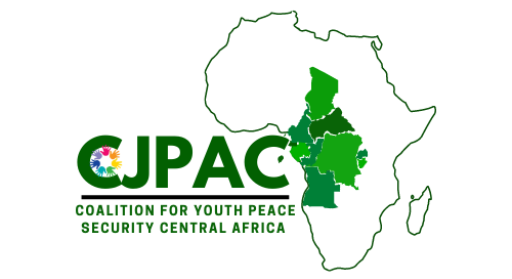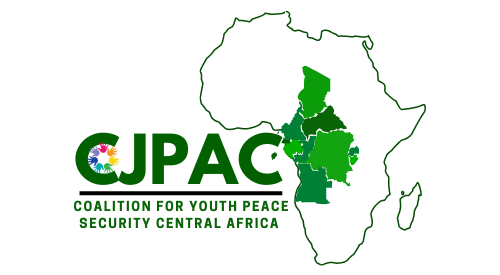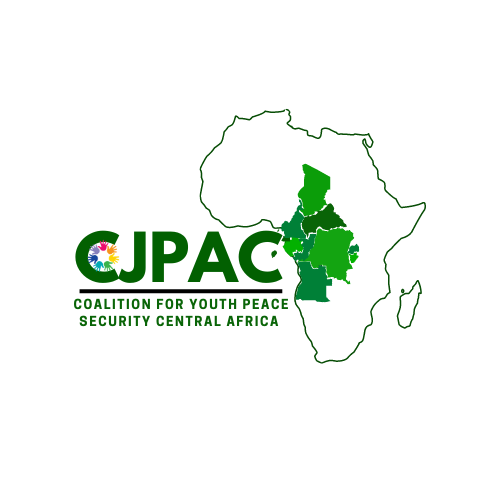Our Partners








Who Can Be Our Partner: Potential partners for the Coalition for Youth-Peace-Security in Central Africa (CJPAC) can include a range of individuals, organizations, and institutions that share a common interest in promoting youth empowerment, peace, and security in the Central African region. This can encompass:
- Regional Bodies: Organizations like ECCAS and UNOCA that work on regional peace and security initiatives.
- Government Agencies: National ministries, departments, or agencies responsible for youth affairs, peace, and security.
- Non-Governmental Organizations: Local and international NGOs with a focus on youth engagement, peacebuilding, and conflict resolution.
- Academic Institutions: Universities and research centers conducting studies on conflict prevention and youth involvement in peace processes.
- International Institutions: UN agencies, regional African institutions, and international development organizations.
- Youth-Led CSOs: Organizations directly led by young people advocating for peace and security.
How We Establish Partnerships: Establishing partnerships involves a strategic and collaborative approach:
- Identify Common Goals: Identify partners that align with CJPAC’s mission and objectives in promoting youth-driven peace and security efforts.
- Outreach and Engagement: Reach out to potential partners through networking events, conferences, workshops, and direct communication.
- Collaborative Planning: Discuss shared goals, areas of collaboration, and potential projects or initiatives that partners can contribute to.
- Memorandums of Understanding (MoUs): Formalize partnerships through MoUs that outline roles, responsibilities, and commitments.
- Joint Initiatives: Work together on projects, campaigns, events, or research that contribute to the youth-led peace and security agenda.
Benefits of Partnerships: Partnerships offer mutual benefits:
- Resource Sharing: Partners can share expertise, knowledge, funding, and resources to amplify impact.
- Leverage Networks: Access each partner’s networks, stakeholders, and connections for wider reach and influence.
- Diverse Perspectives: Collaborating with diverse partners brings varied viewpoints and innovative solutions.
- Capacity Building: Partnerships can lead to skill development, capacity-building workshops, and knowledge exchange.
- Collective Impact: Together, partners can create a more comprehensive and sustainable approach to peacebuilding.
Sustaining Partnerships:
- Regular Communication: Maintain open and regular communication with partners to stay informed and aligned.
- Shared Updates: Provide updates on progress, achievements, and challenges to foster transparency and trust.
- Evaluate and Adjust: Periodically assess partnership outcomes, adjusting strategies as needed to achieve common goals.
- Celebrate Success: Recognize and celebrate joint achievements to strengthen the partnership.
Long-Term Vision:
- Shared Vision: Partnerships should be founded on a shared vision for lasting positive change in youth empowerment and peace.
- Adaptability: Partnerships may evolve over time to address emerging challenges and opportunities.
- Innovation: Encourage partners to innovate, experiment, and find novel ways to tackle peace and security issues.
- Collective Responsibility: Partners share in the responsibility to uphold and advance the goals of the coalition and the broader peacebuilding agenda.
By identifying suitable partners, establishing strong relationships, and fostering collaborative efforts, CJPAC can build a robust network that contributes to the advancement of youth-driven peace and security initiatives in Central Africa.
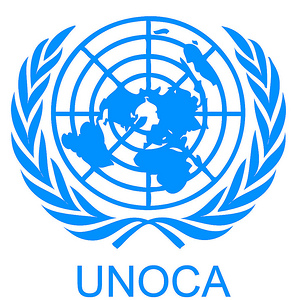 The United Nations Regional Office for Central Africa (UNOCA) is a specialized UN office established to promote peace, security, and development in the Central African region. UNOCA’s primary role is to support regional efforts to prevent conflicts, resolve disputes, and address challenges related to peace and security. In the context of the Coalition for Youth-Peace-Security in Central Africa (CJPAC), UNOCA’s role is to collaborate with and provide support to CJPAC’s initiatives aimed at empowering youth and promoting peace and security.
The United Nations Regional Office for Central Africa (UNOCA) is a specialized UN office established to promote peace, security, and development in the Central African region. UNOCA’s primary role is to support regional efforts to prevent conflicts, resolve disputes, and address challenges related to peace and security. In the context of the Coalition for Youth-Peace-Security in Central Africa (CJPAC), UNOCA’s role is to collaborate with and provide support to CJPAC’s initiatives aimed at empowering youth and promoting peace and security.
UNOCA’s Role in CJPAC:
Technical Expertise: UNOCA can offer technical expertise and guidance to CJPAC, helping ensure that its initiatives align with regional and international peace and security frameworks. This expertise enhances the credibility and effectiveness of CJPAC’s actions.
Capacity Building: UNOCA can provide capacity-building workshops, training, and resources to strengthen the skills and knowledge of youth-led and youth-focused Civil Society Organizations (CSOs) within CJPAC’s network. This empowers these organizations to contribute more effectively to peacebuilding efforts.
Policy Alignment: UNOCA’s experience in conflict prevention, resolution, and peacebuilding can assist CJPAC in aligning its initiatives with regional priorities and policies. This alignment enhances the impact and relevance of CJPAC’s actions.
Networking: UNOCA’s extensive network of regional and international partners can facilitate introductions and collaborations for CJPAC. This helps CJPAC access a broader range of resources, expertise, and opportunities.
Advocacy and Visibility: UNOCA can provide a platform for CJPAC to raise awareness about the importance of youth-led peace and security initiatives. This exposure increases the visibility of CJPAC’s efforts and attracts support from various stakeholders.
Joint Initiatives: UNOCA and CJPAC can collaborate on joint initiatives, such as workshops, seminars, and forums focused on youth participation in peacebuilding. These initiatives create platforms for dialogue and learning.
Resource Mobilization: UNOCA’s connections and expertise can support CJPAC’s efforts to mobilize resources for its initiatives, including funding, technical assistance, and partnerships.
Information Sharing: UNOCA can provide CJPAC with timely information and analysis on regional security trends, potential conflicts, and emerging challenges. This information helps CJPAC tailor its activities to address pressing issues.
Advocacy Support: UNOCA can amplify CJPAC’s advocacy efforts by advocating for the importance of youth-led peacebuilding initiatives at regional and international forums.
Policy Influence: UNOCA’s engagement in policy discussions and decision-making forums related to peace and security enables CJPAC to advocate for youth inclusion and the localization of global peace frameworks at the regional level.
In essence, UNOCA’s partnership with CJPAC enhances the coalition’s impact by leveraging UNOCA’s expertise, networks, and resources to advance the cause of youth empowerment, peace, and security in the Central African region.
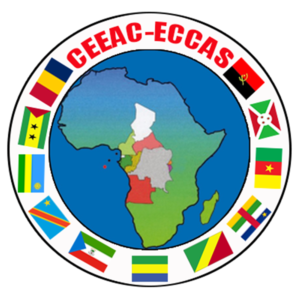 The Economic Community of Central African States (ECCAS) is a regional intergovernmental organization in Central Africa. Its primary objective is to promote cooperation, integration, and development among its member states in various areas, including economic, social, cultural, and political spheres. ECCAS plays a significant role in regional peace and security efforts, which aligns with the goals of the Coalition for Youth-Peace-Security in Central Africa (CJPAC).
The Economic Community of Central African States (ECCAS) is a regional intergovernmental organization in Central Africa. Its primary objective is to promote cooperation, integration, and development among its member states in various areas, including economic, social, cultural, and political spheres. ECCAS plays a significant role in regional peace and security efforts, which aligns with the goals of the Coalition for Youth-Peace-Security in Central Africa (CJPAC).
ECCAS’s Role in CJPAC:
Regional Coordination: ECCAS can provide a platform for coordinating the activities of CJPAC within the broader regional context. This coordination ensures that CJPAC’s initiatives complement and align with ECCAS’s strategies for peace and security in Central Africa.
Policy Alignment: ECCAS’s policies and initiatives related to peace, security, and youth empowerment can serve as a guiding framework for CJPAC. By aligning with ECCAS’s priorities, CJPAC ensures its efforts are relevant and impactful at the regional level.
Resource Mobilization: ECCAS’s established relationships with international partners and donor agencies can assist CJPAC in mobilizing resources, including funding and technical assistance, to support its youth-led peacebuilding initiatives.
Advocacy and Awareness: ECCAS’s platform can amplify the advocacy efforts of CJPAC, helping raise awareness about the importance of youth engagement in peace and security initiatives across the Central African region.
Capacity Building: ECCAS can collaborate with CJPAC to provide capacity-building opportunities for youth-led and youth-focused Civil Society Organizations (CSOs) within the coalition. This strengthens their ability to contribute effectively to peacebuilding.
Partnerships: ECCAS’s engagement with other regional and international partners can facilitate introductions and collaborations for CJPAC. This expands CJPAC’s network and increases its access to expertise and opportunities.
Policy Influence: ECCAS’s involvement in policy discussions and decision-making forums related to peace and security enables CJPAC to advocate for youth inclusion and the localization of global peace frameworks at the regional level.
Conflict Prevention: ECCAS’s focus on conflict prevention aligns with CJPAC’s objectives. By collaborating on projects and initiatives, both organizations can contribute to creating a more stable and secure environment for youth in Central Africa.
In summary, ECCAS’s role in CJPAC involves providing strategic guidance, policy alignment, resource support, and a broader platform for advocating the importance of youth-led peace and security efforts. Through this partnership, CJPAC can leverage ECCAS’s regional influence to enhance its impact and contribute to a more peaceful and secure Central African region.
